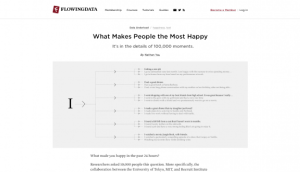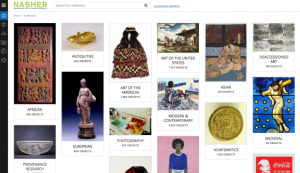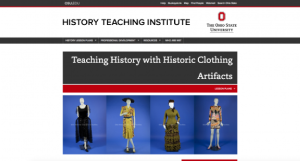General Interest
Back to Top
|
 |
|
Greene Street: A Long History of a Short Block
|
Social studies |
|
New York University's Development Research Institute (DRI) has created this fascinating "interactive documentary" where viewers can explore four centuries of development history on one block of Greene Street in what is known today as New York City's Soho neighborhood. Here, readers will find a richly detailed multimedia presentation guiding viewers through Greene Street's incredibly varied history while incorporating video, sound, historic maps, and high-quality images. After experiencing Greene Street's journey from undeveloped forest to today's designer retail shops and luxury residences (with stops as farmland, a red-light district, a cluster of factories, a Depression-era slum, and an artists' enclave along the way), readers can also view the maps and data separately and download the working paper produced by this research. It should be noted that Greene Street is designed for a full computer screen and is not mobile-friendly. The navigation of this resource may not be immediately intuitive due to its horizontal orientation, but the site signposts its navigation tools well, and the unusual layout complements its timeline structure. This resource was created by William Easterly, Professor of Economics at NYU and Co-Director of DRI, as well as Laura Freschi and Steven Pennings at DRI. [JDC] |
|





|
|
 |
|
 |
|
Science Friday: Undiscovered
|
Science |
|
Readers who are curious about what really goes on in the world of scientific research may want to check out Undiscovered, a podcast produced by the Science Friday initiative. Hosted and produced by Annie Minoff and Elah Feder, this podcast tells stories of "the left turns, missteps, and lucky breaks that make science happen," bringing listeners into the often weird backstories of science. For example, in the episode "Six Degrees," mathematicians Duncan Watts and Steven Strogatz set out to discover the truth behind the phrase "six degrees of separation" and unexpectedly started a whole new field of science in the process. Each episode's page includes show notes with an episode summary, photos, links to relevant resources, and a full transcript. Launched in 2017, Undiscovered just announced the start of their second season, and their full first season is available to stream and download via Apple Podcasts, Spotify, and other platforms. [JDC] |
|





|
|
 |
|
 |
|
Native Plants of North America
|
Science |
|
The Lady Bird Johnson Wildflower Center has created an excellent resource in their database Native Plants of North America. Visitors can search for plants by either their common or scientific names, and the advanced search feature allows searches by combinations of fields such as light requirements, size, and bloom characteristics. This resource also features numerous helpful plant lists; for example, "Bee-friendly Plants" and "Plants for Drought," as well as lists of recommended native plants for nearly every US state and Canadian province. The listings for individual plant species include an image gallery and provide information, such as its scientific name and USDA classification, as well as helpful information for gardeners, for instance, its preferred growing conditions and maintenance tips. Each species listing also contains extensive information on the various benefits that plant offers, like whether it is resistant to deer and if it is of special value to beneficial insects (e.g. native bee species). Those interested in gardening with native flowers would do well to pay this resource a visit. [JDC] |
|





|
|
 |
|
Quanta Magazine: In Theory
|
Science |
|
In keeping with their focus on scientific topics, such as developments in mathematics and theoretical physics, Quanta Magazine recently kicked off their second season of In Theory, a video series that aims to "demonstrate complex ideas in science and math in a clear, quirky and aesthetically pleasing style." The newest installment of this series, created by Emily Driscoll of BonSci Films, examines the concept of universality, "a phenomenon that reveals underlying mathematical connections in the world." In this animated video, this mathematical concept is explored through unexpected phenomena, such as a bus system in Mexico and patterns in chickens' eyes. Currently, there are ten videos available in this series, most of which are under five minutes long. In Theory is produced by Michelle Yun, and its first season was hosted by theoretical particle physicist David Kaplan. [JDC] |
|





|
|
 |
|
The Nasher Museum of Art: Collections
|
Arts |
|
Since its new building opened in 2005, Duke University's Nasher Museum of Art (formerly known as the Duke University Museum of Art) has welcomed more than one million visitors through its doors. For those outside the Durham area, the Nasher Museum also has a sizable digital database where readers can explore more than 6,000 items in the museum's holdings. Here, readers can browse collections, such as "Art of the Americas" with over 1,700 objects from "nearly every culture of pre-Columbian Latin America," more than 800 examples from their photography collection, and over 400 antiquities from Greece, Rome, Egypt, and Etruria. Visitors can also browse the database by categories or people via the menu on the left, and the database is searchable by either objects or people with a variety of subfields. Those doing research can create a free login to be able to save their own groups of items as either public or private collections. [JDC] |
|





|
|
 |
|
Photography as a Social Practice
|
Arts |
|
Founded by Eliza Gregory, Mark Strandquist, and Gemma-Rose Turnbull, Photography as a Social Practice "serves as an archive of research and conversations around photography as a social practice." Materials on the site include links to and coverage of allied projects, interviews with practitioners, and original writing on contemporary photography through the lenses of ethics, representation, power dynamics, and social justice. An example of a project is Let Us Eat Cake, showcasing collaborative work by artist Anthony Luvera and a group of seven LGBTQ+ people documenting queer communities in Northern Ireland. In the interviews section, there's a recent conversation with Dutch photographer Ben Krewickel, whose 2013 book A Possible Life, tells the story of an undocumented immigrant. Finally, the resources section of the site provides listings of events, degree programs, grants, and fellowships, along with reading lists, quotes, and questions. [DS] |
|





|
|




















